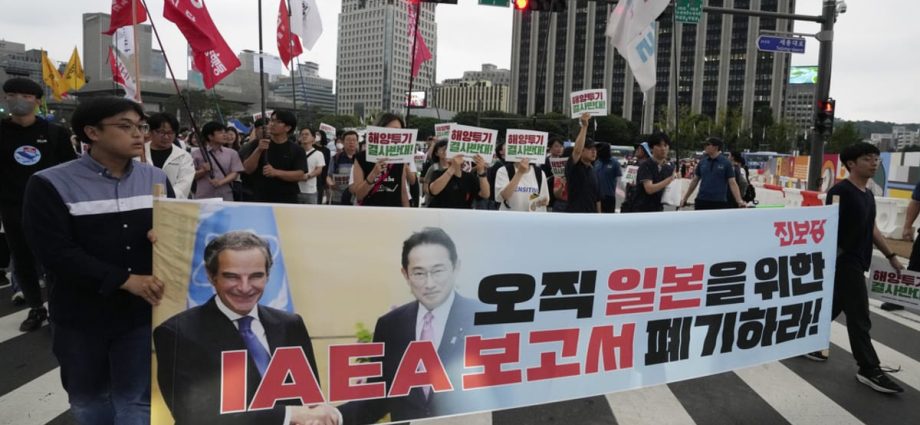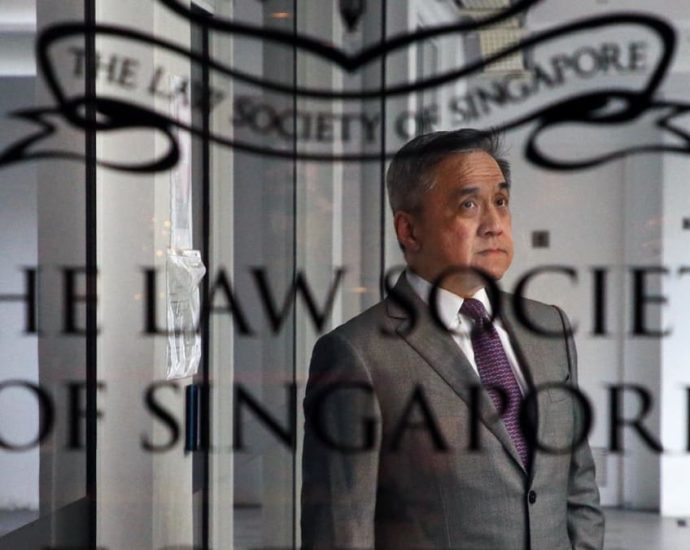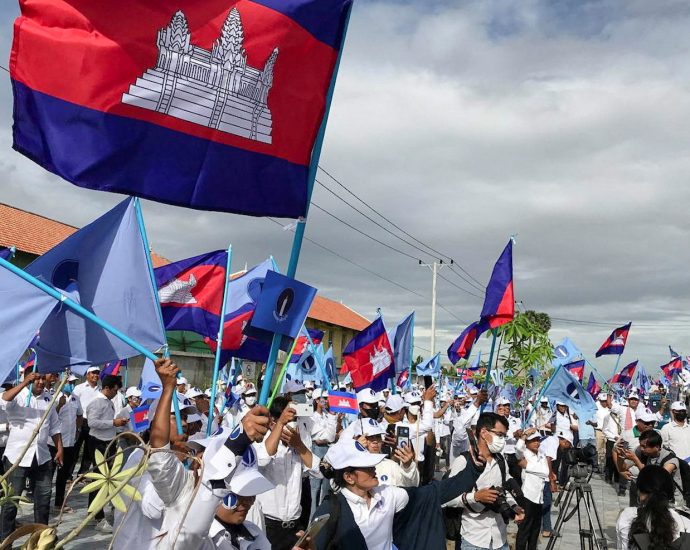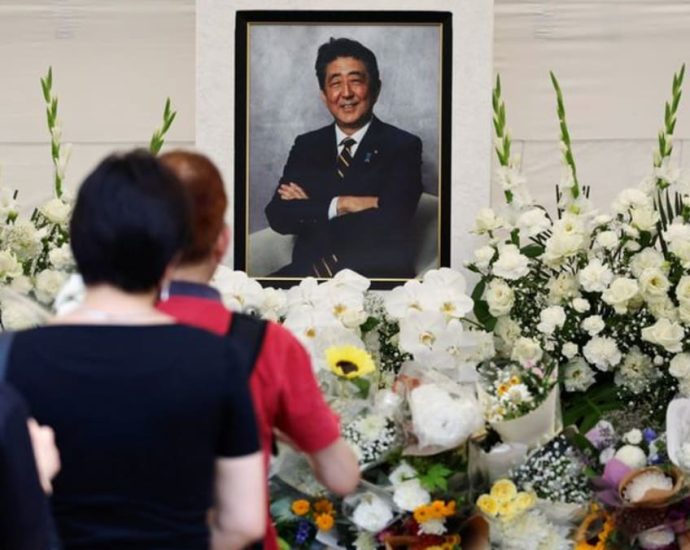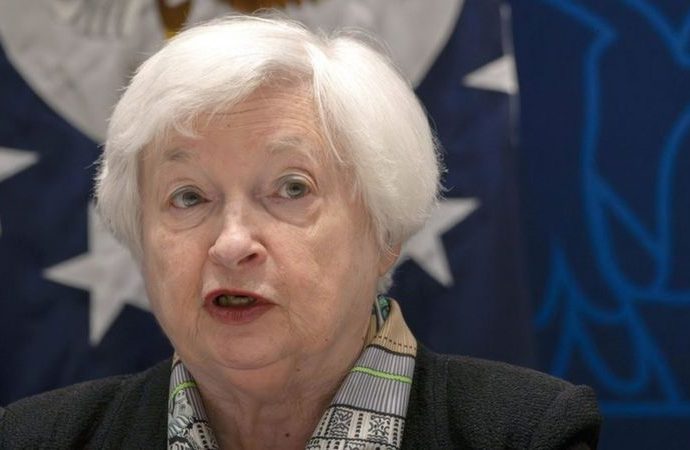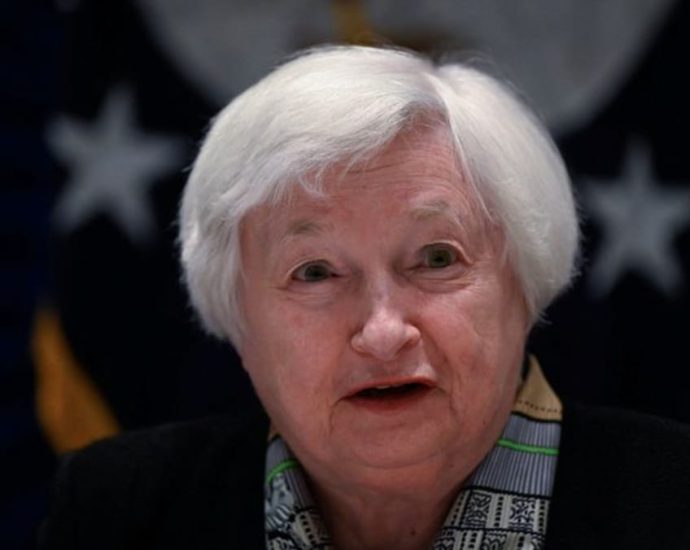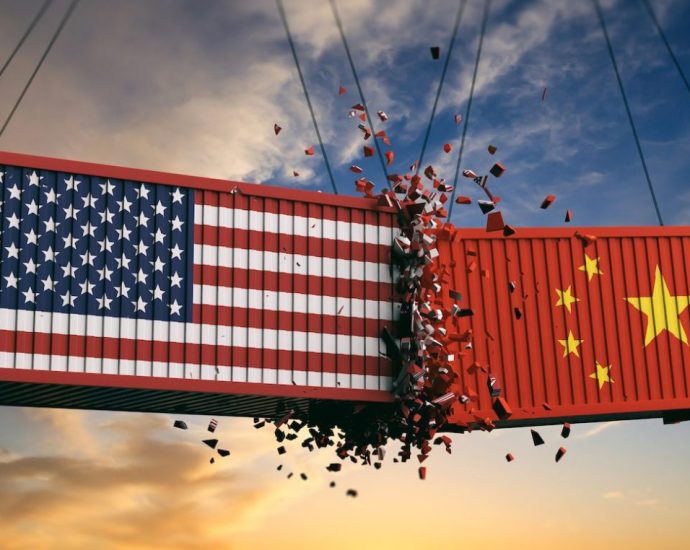South Koreans protest Japan’s plans to release treated wastewater from damaged Fukushima plant
SEOUL: Hundreds of people marched in South Korea’s capital on Saturday (Jul 8) demanding Japan scrap its plans to release treated wastewater from the damaged Fukushima nuclear power plant, as the head of the UN nuclear agency met with senior officials to discuss public concerns over food safety. The protestsContinue Reading
Child porn suspect âoperated more than 30 sitesâ
Man arrested in Chiang Mai also employed eight people in Udon Thani, say police

A 28-year-old man arrested on child pornography charges was found to be operating more than 30 pornographic websites during a police raid on his two houses in Chiang Mai and Udon Thani provinces.
Police armed with a warrant arrested Chaiyaphat Junapong in front of a house in San Pa Tong district of Chiang Mai on Friday, said Pol Maj Gen Athip Wongsiwaphai, commander of the Technology Crime Suppression Division (TCSD).
The arrest followed a tip-off from officials at the US Federal Bureau of Investigation (FBI) and Homeland Security Investigations (HSI) about networks of pornographic websites they believed to be operating from Thailand.
According to the TCSD commander, many offenders distribute pornographic materials on websites and social media, claiming they feature famous actresses and net idols in order to attract viewers. This causes damage to those wrongly claimed to be depicted.
TCSD investigators have also found that many children and young people had fallen victim to those who produced child pornography for distribution online, said Pol Maj Gen Athip.
The latest investigation found that Mr Chaiyaphat was a member of a major child pornography network, with houses in Chiang Mai and Udon Thani. Investigators then sought court warrants to search the two locations.
Seized from the house in Chiang Mai were a computer and two mobile phones. Officers who examined the devices found more than 10,000 pornographic images and videos had been uploaded.
A search of the suspect’s house in Muang district of Udon Thani found many computers and documents about marketing plans for porn websites there. Eight employees were working there during the raid, said Pol Maj Gen Athip.
Mr Chaiyaphat faces charges of producing and distributing child pornographic materials for trade, putting them into a computer system and possessing child pornography for personal gain.
During questioning, Mr Chaiyaphat denied all charges and said he would give his statement before the court only.
He was held police custody for legal proceedings.
Law Society president Adrian Tan dies aged 57
SINGAPORE: Law Society president, Adrian Tan, died on Saturday (Jul 8), after battling cancer for more than a year. He was 57. Mr Tan, a partner at TSMP Law Corporation, was diagnosed with cancer in March last year and went public last July about his condition in a post on professional networking siteContinue Reading
Cambodian opposition figure arrested in Bangkok
Rights group fears member of banned Candlelight Party will be deported and face persecution

A member of a banned Cambodian opposition party has been arrested in Bangkok and is at risk of being deported, Human Rights Watch (HRW) said on Saturday.
Thol Samnang is being held at the Suan Phlu immigration detention centre in central Bangkok, said Sunai Phasuk, senior researcher on Thailand with HRW Asia.
According to local media reports, Thol Samnang was preparing to visit the Bangkok office of the UN High Commissioner for Refugees (UNHCR) when he was apprehended near Victory Monument.
Mr Sunai noted in a tweet that Thailand’s new anti-torture and forced disappearance legislation prohibits the deportation of people who may face harm in the destination country.
The Candlelight Party, the only meaningful opposition party remaining in the country, in late May lost its bid to overturn a ban on taking part in national elections on July 23.
The National Election Committee had refused to register the party after it failed to submit certain documents. The Constitutional Council subsequently upheld the decision, paving the way for long-serving Prime Minister Hun Sen to run a one-horse race.
Critics and rights groups accuse Hun Sen of using the legal system to crush opposition to his rule, particularly in the run-up to elections.
The Candlelight Party gained traction in last year’s local elections, claiming 22% of the popular vote, and was planning to challenge Hun Sen’s ruling Cambodian People’s Party (CPP) in every constituency in the national polls.
In the national elections in 2018, the CPP won every seat after the opposition Cambodia National Rescue Party (CNRP) was dissolved.
The Candlelight Party, formerly known as the Sam Rainsy Party and the Khmer Nation party, was founded in 1995, and merged with other opposition forces to form the CNRP in 2012.
When the CNRP was dissolved in November 2017, almost 90% of its members joined Candlelight, which had strong support among young people.
Japan marks a year since assassination of former prime minister Shinzo Abe
TOKYO: Japan on Saturday (Jul 8) marked one year since former prime minister Shinzo Abe was gunned down during an election speech by a man angry at his links to the Unification Church. The death of Japan’s longest-serving prime minister, which was caught on video, rattled a nation unused toContinue Reading
Janet Yellen asks China to cooperate on climate change action
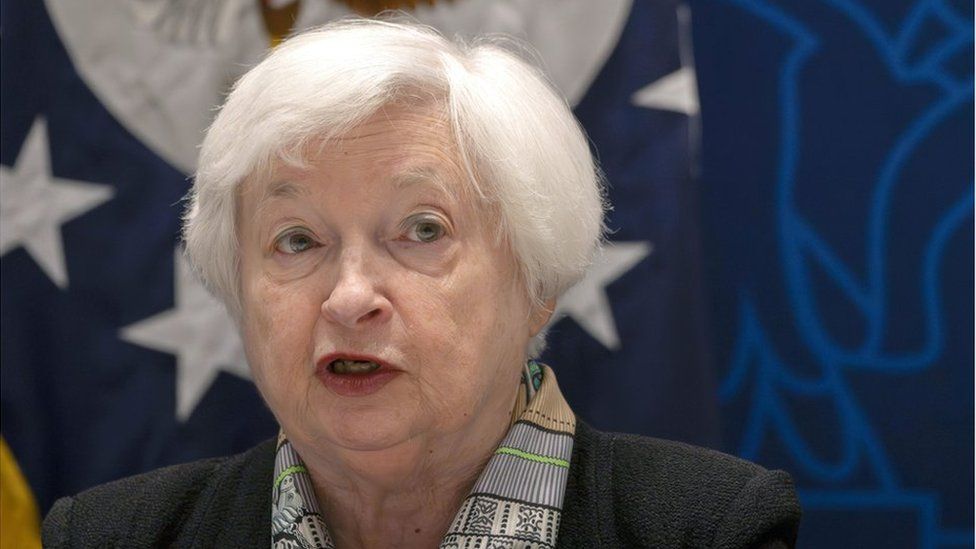 Shutterstock
ShutterstockUS Treasury Secretary Janet Yellen has called on China to work with Washington to fight the “existential threat” of climate change.
Speaking on Saturday, she said the two countries – the largest greenhouse gas emitters – had a joint responsibility to lead the way on climate action.
She called on China to support the US-led Green Climate Fund.
Ms Yellen is on a four-day trip to Beijing in an attempt to boost relations between the two countries.
There’s been no formal co-operation between China and the US on climate change since the administration of former President Donald Trump.
And China briefly suspended climate talks entirely with the US last year after senior Democrat Nancy Pelosi visited Taiwan, which is self-ruled but Beijing sees as a breakaway province it will eventually unite with.
But in a sign that cooperation could soon resume, Ms Yellen called on China to work together with the US to fight climate change and mitigate the effects on poorer countries.
During the roundtable meeting in Beijing with finance experts, she called on China to support US-led institutions like the Green Climate Fund, which was set up to help developing nations adapt to climate change and lessen its effects.
“As the world’s two largest emitters of greenhouse gases and the largest investors in renewable energy, we have both a joint responsibility – and ability – to lead the way,” she said.
China is now the world’s biggest investor in solar energy, and biggest producer of solar panels and wind turbines but saw its carbon dioxide emissions rise 4% in the first quarter of this year compared to 2022.
The US, meanwhile, has invested billions of dollars in recent years into initiatives aimed at tackling climate change but also saw its emissions rise slightly last year, according to the International Energy Agency.
While Ms Yellen wants China to join the US in funding the worldwide transition to renewables, the sticking point is China’s insistence that it is still a developing country.
Beijing says it is up to the US and Europe to pay for the energy transition, because they have historically created most of the emissions.
Ms Yellen is the second senior Washington official to visit Beijing in the last two months. Her presence there is aimed at easing tensions and restoring ties between the world’s two superpowers.
US Secretary of State Antony Blinken visited Beijing last month, making him the highest-ranking Washington official to visit the Chinese capital in almost half a decade. He met President Xi Jinping and foreign minister Qin Gang.
At the end of his trip, Mr Blinken said that while there were still major issues between the two countries, he hoped they would have “better communications, better engagement going forward.”
However, the next day President Joe Biden referred to Mr Xi as a “dictator” – triggering protests from Beijing. While analysts said Mr Biden’s comment was unlikely to have a major negative effect, it was also widely seen as not helping matters.
In another sign the trade dispute between the two countries is far from being resolved, China this week announced it was tightening controls over exports of two materials crucial to producing computer chips.
From next month, special licences will be needed to export gallium and germanium from China, which is the world’s biggest producer of the metals.
Related Topics
-
-
23 hours ago
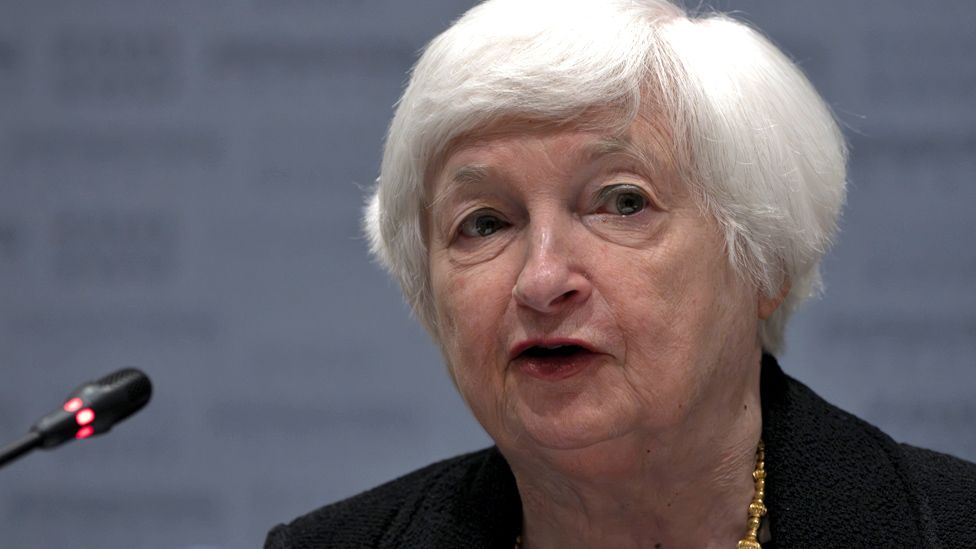
-
Yellen stresses ‘fair’ rules, communication in Beijing meetings
BEIJING: The United States and China, the world’s two biggest economies, must compete fairly and communicate closely to avoid misunderstandings, US Treasury Secretary Janet Yellen said in Beijing on Saturday (Jul 8). Yellen, continuing her meetings with top Chinese officials, told Vice Premier He Lifeng that a bilateral record forContinue Reading
Pavinâs book about monarchy banned in Thailand
Police chief warns of jail and fines for importing yet-to-be published title

A book about the monarchy written by academic-in-exile Pavin Chatchavalpongpun has been banned in Thailand for defaming the monarchy, according to a police announcement published in the Royal Gazette on Friday.
The announcement said the cover and contents of Rama X: The Thai Monarchy under King Vajiralongkorn reflected attitudes deemed insulting, defaming or displaying great malice towards the king, the queen, heir apparent or regent, or threatening national security, peace and order or public morality.
The announcement was signed Pol Gen Damrongsak Kittiprapas, the national police chief, on June 19, according to the Royal Gazette. It cited Section 10 of the Printing Recordation Act BE 2550 (2007) for banning the book.
Anyone who imports the book into Thailand is liable to a jail term of up to 3 years and/or a fine of up to 60,000 baht. The police chief had the authority to destroy the book, said the announcement, which takes effect immediately.
“My book has been banned despite the fact that nobody has read it,” Mr Pavin wrote on his Facebook page. “It will be on shelves in the United States in October and an e-book will also be available.”
Mr Pavin, 52, is a professor at Kyoto University and editor-in-chief of the Kyoto Review of Southeast Asia, published by the school’s Center for Southeast Asian Studies.
He worked for the Thai Ministry of Foreign Affairs for 13 years before becoming a political science academic. He has been an outspoken critic of the political establishment and pushed for reform of Section 112 of the Criminal Code, the lese-majesté law.
He moved to Japan in 2012 to take up his position at Kyoto University, but continued to comment regularly on Thai affairs for international publications.
After the 2014 military coup, he was ordered to report to authorities but he refused. The National Council for Peace and Order subsequently issued an arrest warrant for Mr Pavin but he declined to return to Thailand and has lived abroad ever since.
The fatal contradictions of China-bashing

The contradictions of China-bashing in the United States begin with how often it is flat-out untrue.
The Wall Street Journal reports that the “Chinese spy” balloon that President Joe Biden shot down with immense patriotic fanfare in February did not in fact transmit pictures or anything else to China.
White House economists have been trying to excuse persistent US inflation saying it is a global problem and inflation is worse elsewhere in the world. China’s inflation rate is 0.7% year on year.
Financial media outlets stress how China’s GDP growth rate is lower than it used to be. China now estimates that its 2023 GDP growth will be 5-5.5%. Estimates for the US GDP growth rate in 2023, meanwhile, vacillate around 1-2%.
China-bashing has intensified into denial and self-delusion – it is akin to pretending that the United States did not lose wars in Vietnam, Afghanistan, Iraq and more.
The BRICS coalition (China and its allies) now has a significantly larger global economic footprint (higher total GDP) than the Group of Seven (the United States and its allies).
China is outgrowing the rest of the world in research and development expenditures.
The American empire (like its foundation, American capitalism) is not the dominating global force it once was right after World War II. The empire and the economy have shrunk in size, power and influence considerably since then. And they continue to do so.
Putting that genie back into the bottle is a battle against history that the United States is not likely to win.
The Russia delusion
Denial and self-delusion about the changing world economy have led to major strategic mistakes. US leaders predicted before and shortly after February 2022, when the Ukraine war began, for example, that Russia’s economy would crash from the effects of the “greatest of all sanctions,” led by the United States. Some US leaders still believe that the crash will take place (publicly, if not privately) despite there being no such indication.
Such predictions badly miscalculated the economic strength and potential of Russia’s allies in the BRICS. Led by China and India, the BRICS nations responded to Russia’s need for buyers of its oil and gas.
The United States made its European allies cut off purchasing Russian oil and gas as part of the sanctions war against the Kremlin over Ukraine. However, US pressure tactics used on China, India, and many other nations (inside and outside BRICS) likewise to stop buying Russian exports failed. They not only purchased oil and gas from Russia but then also re-exported some of it to European nations.
World power configurations had followed the changes in the world economy at the expense of the US position.
The military delusion
War games with allies, threats from US officials, and US warships off China’s coast may delude some to imagine that these moves intimidate China. The reality is that the military disparity between China and the United States is smaller now than it has ever been in modern China’s history.
China’s military alliances are the strongest they have ever been. Intimidation that did not work from the time of the Korean War and since then will certainly not be effective now.
Former president Donald Trump’s tariff and trade wars were meang, US officials said, to persuade China to change its “authoritarian” economic system. If so, that aim was not achieved. The United States simply lacks the power to force the matter.
American polls suggest that media outlets have been successful in a) portraying China’s advances economically and technologically as a threat, and b) using that threat to lobby against regulations of US high-tech industries.
The tech delusion
Of course, business opposition to government regulation predates China’s emergence. However, encouraging hostility toward China provides convenient additional cover for all sorts of business interests.
China’s technological challenge flows from and depends on a massive educational effort based on training far more STEM (science, technology, engineering and mathematics) studengs than the United States does. Yet US business does not support paying taxes to fund education equivalently.
The reporting by the media on this issue rarely covers that obvious contradiction and politicians mostly avoid it as dangerous to their electoral prospects.
Scapegoating China joins with scapegoating immigrants, BIPOCs (black and Indigenous people of color), and many of the other usual targets.
The broader decline of the US empire and capitalist economic system confronts the nation with the stark question: Whose standard of living will bear the burden of the impact of this decline? The answer to that question has been crystal clear: The US government will pursue austerity policies (cut vital public services) and will allow price inflation and then rising interest rates that reduce living standards and jobs.
Coming on top of 2020’s combined economic crash and Covid-19 pandemic, the middle- and-lower-income majority have so far borne most of the cost of the United States’ decline. That has been the pattern followed by declining empires throughout human history: Those who control wealth and power are best positioned to offload the costs of decline on to the general population.
The real sufferings of that population cause vulnerability to the political agendas of demagogues. They offer scapegoats to offset popular upset, bitterness and anger.
Leading capitalists and the politicians they own welcome or tolerate scapegoating as a distraction from those leaders’ responsibilities for mass suffering. Demagogic leaders scapegoat old and new targets: immigrants, BIPOCs, women, socialists, liberals, minorities of various kinds, and foreign threats.
The scapegoating usually does little more than hurt its intended victims. Its failure to solve any real problem keeps that problem alive and available for demagogues to exploit at a later stage (at least until scapegoating’s victims resist enough to end it).
The contradictions of scapegoating include the dangerous risk that it overflows its original purposes and causes capitalism more problems than it relieves.
If anti-immigrant agitation actually slows or stops immigration (as has happened recently in the United States), domestic labor shortages may appear or worsen, which may drive up wages, and thereby hurt profits.
If racism similarly leads to disruptive civil disturbances (as has happened recently in France), profits may be depressed.
If China-bashing leads the United States and Beijing to move further against US businesses investing in and trading with China, that could prove very costly to the US economy. That this may happen now is a dangerous consequence of China-bashing.
Working together (briefly)
Because they believed it would be in the US interest, then-president Richard Nixon resumed diplomatic and other relations with Beijing during his 1972 trip to the country. Chinese chairman Mao Zedong, premier Zhou Enlai, and Nixon started a period of economic growth, trade, investment and prosperity for both China and the United States.
The success of that period prompted China to seek to continue it. That same success prompted the United States in recent years to change its attitude and policies. More accurately, that success prompted US political leaders like Trump and Biden to now perceive China as the enemy whose economic development represents a threat. They demonize the Beijing leadership accordingly.
The majority of US mega-corporations disagree. They profited mightily from their access to the Chinese labor force and the rapidly growing Chinese market since the 1980s. That was a large part of what they meant when they celebrated “neoliberal globalization.” A significant part of the US business community, however, wants continued access to China.
The fight inside the United States now pits major parts of the US business community against Biden and his equally “neoconservative” foreign-policy advisers. The outcome of that fight depends on domestic economic conditions, the presidential election campaign, and the political fallout of the Ukraine war as well the ongoing twists and turns of the China-US relations.
The outcome also depends on how the masses of Chinese and US people understand and intervene in relations between these two countries. Will they see through the contradictions of China-bashing to prevent war, seek mutual accommodation, and thereby rebuild a new version of the joint prosperity that existed before Trump and Biden?
This article was produced by Economy for All, a project of the Independent Media Institute, which provided it to Asia Times.
Russian man dies after falling from pagoda in Phuket

PHUKET: A Russian man died after falling from the roof of a pagoda in Muang district of this island province on Friday night.
Police received a report that the tourist, whose name was not identified, climbed up to the roof of the pagoda at Wat Chaithararam, or better known as Wat Chalong, in tambon Chalong at around 5.30pm.
Police and rescue workers rushed to the scene to help persuade him to climb down, as they were concerned that he might jump and take his own life. By 7.55pm, he still refused to come down.
Phuket Governor Narong Woonciew, along with local officials, rescue teams, medics and concerned agencies, arrived at the temple, and safety cushions were prepared.

The Russian man is seen standing on the roof of a pagoda at Wat Chalong in Phuket on Friday evening. Police and officials tried in vain to persuade him to climb down. (Photo: Achadthaya Chuenniran)
After negotiations failed, rescue staff charged towards the tourist at around 8.27pm. During the struggle, the man fell onto the safety cushions but sustained injuries. The medics immediately transported him to Vachira Phuket Hospital.
Hospital officials reported that his heart had stopped beating, and doctors on duty were making efforts to resuscitate him.
Local news media reported on Saturday morning that the Russian man had died.

Wat Chaithararam, or Wat Chalong, is a historical landmark and Buddhist temple in Phuket’s Chalong Bay. (File photo: Achadthaya Chuenniran)

